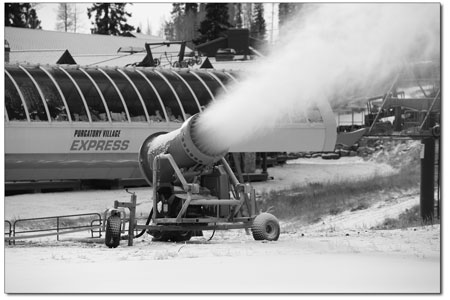 |
| Durango Mountain Resort, a member of the National Ski Areas Association, makes snow earlier this season. The NSAA, a trade group, recently filed suit against the Forest Service over a clause in ski area permits that could jeopardize their water rights./Photo by Stephen Eginoire |
The fight for the right
Ski Association sues Forest Service over water rights clause
by Tracy Chamberlin
The fight for water rights is headed to court after the U.S. Forest Service added a new clause to ski-area permit applications, requiring them to transfer ownership of some water rights to the United States.
The fight for water rights is headed to court after the U.S. Forest Service added a new clause to ski-area permit applications, requiring them to transfer ownership of some water rights to the United States.
The National Ski Areas Association filed a lawsuit against the Forest Service and the U.S. Department of Agriculture on Jan. 10 challenging the new clause, which they say amounts to an “unconstitutional taking of property.”
“We greatly value our longstanding and successful partnership with the United States Forest Service,” said NSAA President Michael Berry. “… But water rights are simply too critical and valuable to our operations not to defend ourselves against this outright taking of private property by the U.S. government.”
The USFS said the purpose of the new clause was to protect ski area operations for the long term. By attaching the water rights to the United States, they are attached to the public lands and could not be parted out or sold off, assuring future buyers that the water would be there.
The nine-page clause, called Clause D-30, went into effect Nov. 8 last year. Three ski areas, whose permits had expired, were forced to sign the document in order to renew their permits for the 2011-12 season: Alpine Meadows in California; Stevens Pass in Washington; and Powderhorn, near Grand Junction.
Any ski area or resort whose permits expire next season could find themselves in the same situation.
In the document, the Forest Service requires ski areas and resorts to transfer ownership of several types of water rights, including rights that have been purchased by the ski areas, to the United States. It even gives the Forest Service power of attorney in certain circumstances.
Also any resort or ski area requesting a permit must also agree to waive any claim to compensation for the water rights, for costs connected with dividing or transferring the water rights, or for costs related to the operation and maintenance of facilities.
“These are valuable private property rights which the Forest Service now wants for free,” said Glenn Porzak, an attorney for the Boulder-based firm Porzak Browning & Bushong, during testimony before Congress late last year.
In his testimony before the House of Representatives Natural Resources Subcommittee, Porzak laid out the ski industry’s concerns with the new clause, and commented on possible litigation if the Forest Service was unwilling to continue negotiations.
Porzak said the USFS claim to ownership of the water rights is no different than if it claimed ownership of the gondolas, chairlifts, snowcats, snowmobiles or any other property the resorts and ski areas own and need to run their businesses.
He added that this issue extends beyond ski areas, and could impact any business or entity that has water rights associated with Forest Service lands including cities, counties, marinas, summer resorts, ranchers, and mining or utility companies.
“All water rights owners, not just ski areas, should be concerned about this precedent,” said Porzak, whose firm has also represented Durango Mountain Resort on water supply projects.
Porzak, along with other federal and state officials, asked the USFS to delay implementation of the clause, reconsider its language and possibly start over.
Colorado Gov. John Hickenlooper and Sens. Mark Udall, D-Colo., and Michael Bennet, D-Colo., joined Reps. Scott Tipton, R-Colo., and Jared Polis, D-Colo., as well as several politicians form other states joined the NSAA asking the Forest Service to take another look at the controversial clause.
However, the Forest Service refused, forcing the NSAA to file the suit in federal court, requesting a judicial review and injunction.
The lawsuit requests an injunction to set aside the directive on the grounds it is “arbitrary, capricious, in excess of the Forest Service’s statutory authority, compels an uncompensated taking of private property, and was adopted without public notice or an opportunity to comment.”
The USFS has been issuing ski-area permits under a 2004 regulation. Porzak stated in his testimony that these regulations have been working for both parties involved, and the new clause does not add any additional protections to Forest Service lands. He sees no reason for the change.
“Ski areas have been excellent stewards of these resources and are in the best position to protect these water rights,” Porzak said. “They have the expertise, staffing and resources necessary to maintain them.”
Ninety percent of skiers and snowboarders across the nation visit NSAA members every year. Out of the 321 members of the nonprofit trade association for ski area owners and operators, 121 operate on Forest Service lands and 21 operate on Forest Service lands in Colorado.
Durango Mountain Resort is one of those resorts.
Sitting in the San Juan National Forest, DMR has often negotiated with the USFS concerning not just ski-area permits, but also land use regulations and development projects.
“Water and water rights are critical to ski area operations,” said Kim Oyler, director of communications at DMR. “That’s why the industry is supporting NSAA’s efforts to get this issue resolved.”
